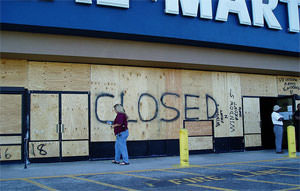How to Beat Wal-Mart
Stacy Mitchell chronicles the successful campaigns of community activists around the country who've taken on retail giants and won. The key to victory is "getting people to see themselves not just as consumers, but as workers, producers, business owners, citizens, and stewards of their community."
Stacy Mitchell chronicles the successful campaigns of community activists around the country who’ve taken on retail giants and won. The key to victory is “getting people to see themselves not just as consumers, but as workers, producers, business owners, citizens, and stewards of their community.”
Your support matters…Alternet:
Citizens groups are waging a growing number of successful campaigns against big-box retailers. They are winning victories in places as far-flung as Damariscotta, Maine, a coastal village where two stay-at-home moms ignited an uprising this past spring that not only blocked a Wal-Mart supercenter but led several towns to adopt store size cap laws that effectively ban big boxes region-wide, and Inglewood, California, a working class city near Los Angeles where voters handed Wal-Mart a stunning upset two years ago even though the chain spent over $1 million on a massive public relations blitz.
Despite differences in circumstances and demographics, all of these successful campaigns — and there have been dozens in the last two years — have one striking commonality: a core part of their strategy involves getting people to see themselves not just as consumers, but as workers, producers, business owners, citizens, and stewards of their community. When people walk into a voting booth or city council meeting with this vastly expanded sense of their own economic and political identity, they are far more likely to reject big-box development projects and to endorse measures that force these companies to adhere to higher standards. This is a crucial lesson as we work to knit these local efforts together into a broader movement to counter the power of global corporations.
In contrast, when the big chains win, they do so by getting people to assume the familiar and narrow role of consumer and to view their relentless expansion and radical restructuring of the economy as simply a matter of shopping options.
Although pervasive in its influence today, this consumer identity is a relatively recent invention. It only became a powerful force in U.S. politics in the years after World War II. To a large degree, it was created and propagated by the first generation of chain retailers-companies like A&P, Kroger, and Woolworth-which encountered such strong public opposition in the 1920s and 30s as to call into doubt their continued existence. The chains responded with a massive PR campaign that managed to transform American citizens into consumers-a sharply circumscribed identity that corporations have used to augment their power ever since.
Independent journalism is under threat and overshadowed by heavily funded mainstream media.
You can help level the playing field. Become a member.
Your tax-deductible contribution keeps us digging beneath the headlines to give you thought-provoking, investigative reporting and analysis that unearths what's really happening- without compromise.
Give today to support our courageous, independent journalists.






You need to be a supporter to comment.
There are currently no responses to this article.
Be the first to respond.